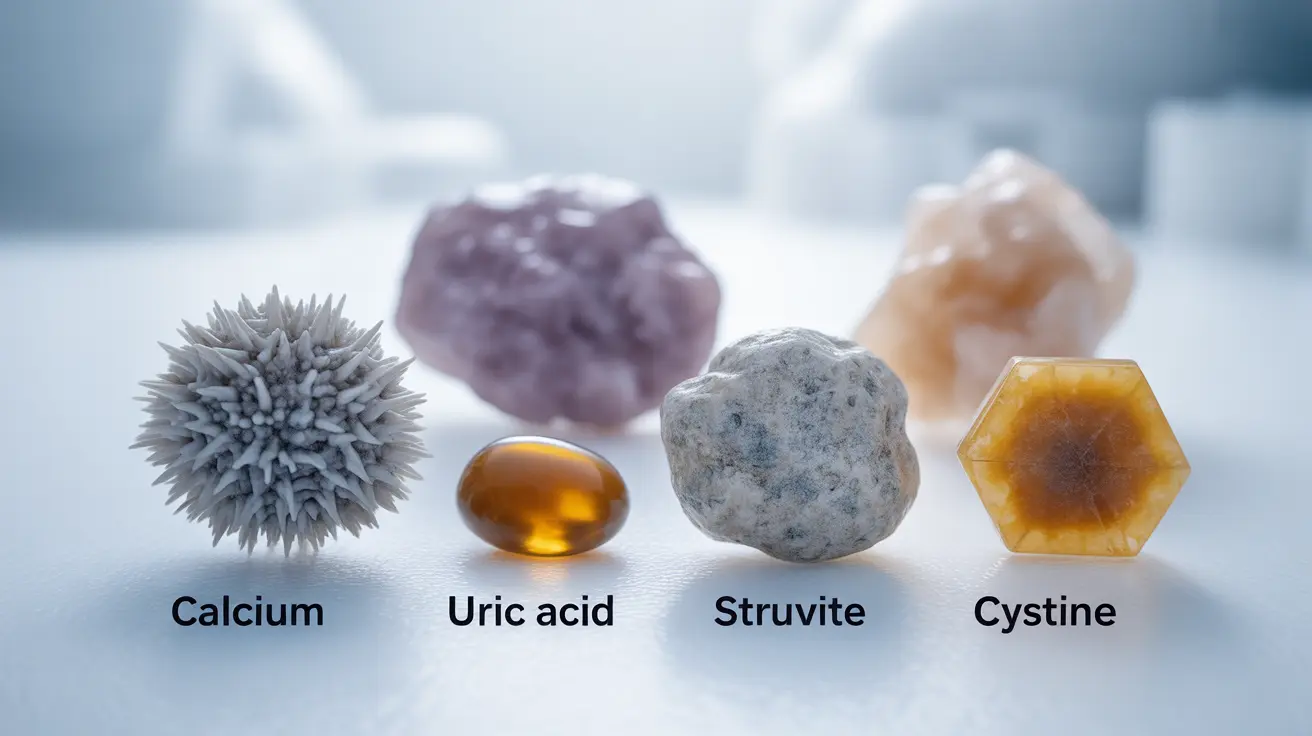Kidney stones affect millions of people worldwide, and understanding the different types is crucial for proper treatment and prevention. These hard deposits form when minerals and other substances in your urine crystallize and bind together. Each type of kidney stone has distinct characteristics, causes, and treatment approaches.
This comprehensive guide will explore the various types of kidney stones, their causes, diagnosis methods, and specific treatment options. Whether you're dealing with kidney stones or want to prevent them, knowing the differences between types can help you make informed healthcare decisions.
Common Types of Kidney Stones
There are four main types of kidney stones, each with unique characteristics and formation patterns:
Calcium Stones
Calcium stones are the most common type, accounting for about 80% of all cases. They primarily come in two forms:
- Calcium oxalate stones: Most prevalent, formed when calcium binds with oxalate
- Calcium phosphate stones: Less common, typically occurring in metabolic conditions
Uric Acid Stones
These stones form when urine becomes too acidic. They're common in people who:
- Eat a high-protein diet
- Have gout
- Undergo chemotherapy
- Are dehydrated frequently
Struvite Stones
These stones are often associated with urinary tract infections and can grow quite large. They're more common in women and can develop rapidly, sometimes with little warning. They contain magnesium ammonium phosphate and can lead to serious complications if left untreated.
Cystine Stones
The rarest type, cystine stones occur in people with a hereditary disorder called cystinuria. These stones often begin forming in childhood and can recur frequently without proper management.
Risk Factors and Causes
Different types of kidney stones have varying risk factors:
- Dietary habits (high sodium, animal protein, or oxalate intake)
- Family history
- Medical conditions
- Dehydration
- Obesity
- Certain medications
Diagnosis Methods
Healthcare providers use several methods to identify kidney stone types:
Imaging Tests
- CT scans: Provide detailed stone images
- Ultrasound: Used for ongoing monitoring
- X-rays: Help track stone movement
Stone Analysis
Once passed or removed, stones can be analyzed to determine their exact composition, which is crucial for preventing future occurrences.
Treatment Approaches
Treatment varies based on the stone type and size:
Small Stones
- Drinking plenty of water
- Pain management
- Medical expulsive therapy
Larger Stones
- Shock wave lithotripsy
- Ureteroscopy
- Percutaneous nephrolithotomy
- Surgical removal in severe cases
Prevention Strategies
Prevention methods differ by stone type:
- Calcium stones: Monitor calcium and oxalate intake
- Uric acid stones: Reduce animal protein consumption
- Struvite stones: Treat underlying infections promptly
- Cystine stones: Medication and increased fluid intake
Frequently Asked Questions
What are the different types of kidney stones and how do they differ in shape and frequency?
Kidney stones come in four main types: calcium (most common, usually spiky), uric acid (smooth, amber-colored), struvite (large, crystal-like), and cystine (hexagonal-shaped, yellow-brown).What causes each type of kidney stone and who is most at risk?
Calcium stones often result from high oxalate diets or excess calcium absorption. Uric acid stones occur in those with high-protein diets or gout. Struvite stones develop from infections, mainly affecting women. Cystine stones are genetic and rare.How are kidney stones diagnosed and what tests identify the stone type?
Diagnosis typically involves imaging tests (CT scans, ultrasounds, X-rays) and laboratory analysis of passed stones. Blood and urine tests help determine underlying causes.What treatment options are available for different types of kidney stones?
Treatment ranges from conservative management (hydration, pain control) for small stones to interventional procedures (lithotripsy, surgery) for larger ones. The approach depends on stone size, type, and location.How can I prevent kidney stones based on their specific type?
Prevention strategies vary by stone type but generally include adequate hydration, dietary modifications, and treating underlying conditions. Regular monitoring and medication may be necessary for certain types.




